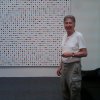Born in Yugoslavia in 1933, Vasa Mihich, an academically trained painter, became a member of the faculty at the University of Belgrade in 1956. During a visit to Paris that same year, Vasa became aware of the growing importance of American art, and four years later he immigrated to the United States. Influenced by the major changes taking place in art in the United States and especially in Los Angeles, Vasa began working in three-dimensional painted constructions in 1964. This work was first shown in January, 1966 in the Feigen-Palmer Gallery in Los Angeles and that same year was included in the seminal exhibit American Sculptures of the Sixties at the Los Angeles County Art Museum and other museum and university exhibits. 1967 was an important year for Vasa. He began including plastic in his work. A painter interested in placing color in open space, he began to use clear plastic as a structural support for different planes of color. Expecting to explore this medium for a few years, Vasa, to his surprise, continues some thirty years later to discover new possibilities. In 1967 he also returned to teaching, joining the faculty at UCLA where he continues to teach.
Except for a brief stay in New York, Vasa has lived in California since his arrival in the United States. Here in his comprehensive studio, located in the heart of Los Angeles and designed and built to accommodate the machinery, staff and advanced technology required for his work, Vasa creates and makes all of his art. And now, in response to the new information age the artist has designated several works for presentation and commission on the internet.
Links





